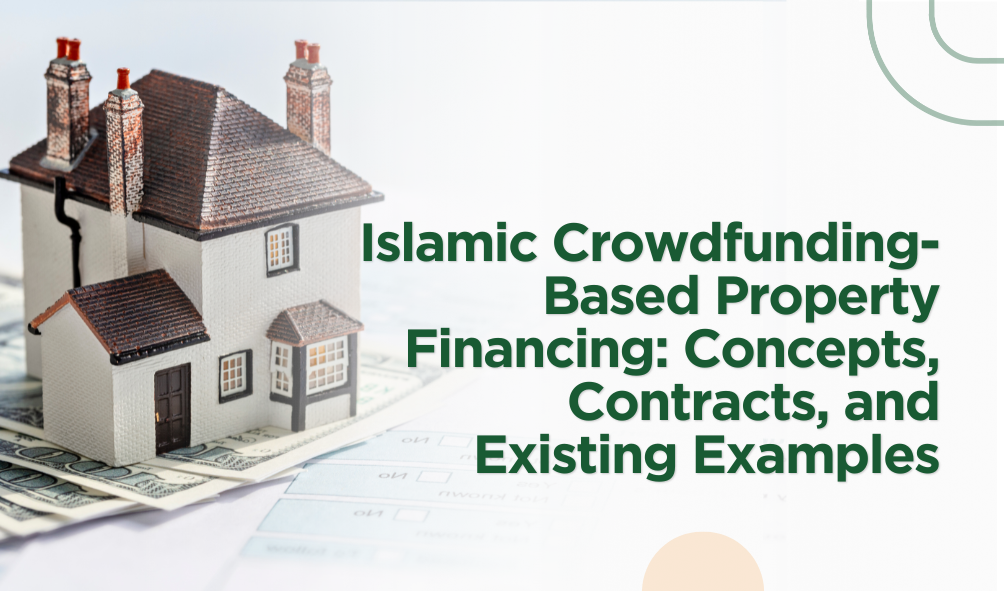Islamic Crowdfunding-Based Property Financing: Concepts, Contracts, and Existing Examples
Islamic crowdfunding-based property financing is a mechanism that gathers funds from various investors to finance property projects while adhering to Sharia principles. This method has gained popularity as it offers an ethical and community-based financing alternative that aligns with Islamic values. In the context of modern economics, Sharia-compliant financing plays a crucial role in providing access to capital for individuals and businesses that may not qualify for conventional financing.
Concept of Sharia Crowdfunding
Sharia crowdfunding combines Islamic finance principles with modern technology. Key Sharia principles such as the prohibition of riba (interest), gharar (uncertainty), and maisir (speculation) are applied to ensure all transactions are fair and transparent. Sharia crowdfunding platforms act as intermediaries connecting investors with property projects that need funding. This allows small investors to participate in large projects that were previously accessible only to institutional investors or high-net-worth individuals.
Sharia crowdfunding not only meets financing needs but also emphasizes ethical and just transactions. This differs from conventional financing, which often imposes high interest rates and does not provide equitable benefits to all involved parties. Additionally, the use of modern technology ensures transparency and efficiency in the fund-raising process and project implementation.
Also Read: Pembiayaan Agraria Berbasis Crowdfunding Syariah: Konsep, Akad, dan Manfaatnya
Types of Contracts in Sharia Crowdfunding
In Sharia crowdfunding, several types of contracts (akad) can be used to ensure compliance with Sharia principles.
The Mudharabah contract is where investors provide capital to the project manager, who manages the project in exchange for a share of the generated profits. In this contract, risks and profits are shared according to the initial agreement. The project manager is fully responsible for managing the project, while investors act as capital providers. Profits are shared based on a pre-agreed ratio, and if a loss occurs, the investor bears the capital loss while the manager loses the time and effort invested.
The Musyarakah contract involves a partnership between two or more parties who share capital and profits. Each party contributes in the form of capital or expertise and shares profits according to the agreed proportions. In this contract, all involved parties have equal rights and responsibilities in managing the project. Profits and losses are shared proportionally according to each party’s contribution. Musyarakah is often used in large projects requiring collaboration between multiple parties to achieve common goals.
The Murabahah contract is a sales contract where the crowdfunding platform buys the property and resells it to investors at an agreed profit margin. Investors make payments in installments. In this contract, the sale price includes the original purchase cost and an agreed profit margin. Investors know the original purchase price and the profit margin taken by the platform, making this transaction transparent and free from speculation. Murabahah is often used in property financing requiring staggered payments.
Examples of Islamic Crowdfunding-Based Property Financing
GORO is an example of a Sharia-compliant crowdfunding platform focusing on property financing in Indonesia. GORO uses Sharia principles to ensure that all investments and projects funded comply with Sharia law. GORO has financed various property projects, including residential and commercial properties, providing positive social impacts and supporting sustainable development. As a Sharia crowdfunding platform, GORO facilitates fund-raising from diverse investors for projects meeting Sharia standards. By leveraging technology, GORO ensures that the investment process is transparent and accessible to investors from various backgrounds.
Additionally, Ethis, a Singapore-based Sharia crowdfunding platform, has financed various property projects in Indonesia and Malaysia. Ethis uses the musyarakah contract to ensure Sharia compliance, allowing investors to contribute to sustainable housing projects that have a positive social impact. Ethis focuses on projects that provide social and economic benefits to communities, such as affordable housing developments and infrastructure projects that support local communities. Through this approach, Ethis aims to create sustainable positive impacts in the regions where they operate.
In the Middle East, platforms like Beehive and SmartCrowd offer property financing using Sharia principles. Beehive focuses on financing commercial properties using the musyarakah contract, enabling small and medium enterprises to access capital for expansion. SmartCrowd, on the other hand, allows individuals to invest in residential properties using the mudharabah contract, providing investors access to the property market that was previously out of reach. By providing a secure and transparent platform, Beehive and SmartCrowd help create fair and Sharia-compliant investment opportunities for investors from diverse backgrounds.
Islamic crowdfunding-based property financing offers an attractive and Sharia-compliant alternative for investors looking to participate in property projects. By applying Sharia principles and utilizing various types of contracts, these crowdfunding platforms can provide fair and transparent benefits for all involved parties. In the future, the potential for this type of financing will continue to grow as awareness and demand for ethical and sustainable financial products increase. Sharia crowdfunding not only provides innovative financing solutions but also contributes to inclusive and sustainable economic development, benefiting broader society.
Wallahu a’lam

References
- Ayub, M. (2007). Understanding Islamic Finance. John Wiley & Sons.
- Iqbal, Z., & Mirakhor, A. (2011). An Introduction to Islamic Finance: Theory and Practice. John Wiley & Sons.
- Obaidullah, M., & Khan, T. (2008). Islamic Microfinance Development: Challenges and Initiatives. Islamic Research and Training Institute.
- Rahman, A. R. A. (2010). Islamic Microfinance: An Ethical Alternative to Poverty Alleviation. Humanomics, 26(4), 284-295.
- Usmani, M. T. (2002). An Introduction to Islamic Finance. Kluwer Law International.
- GORO | Property for All. (n.d.). Goro.id. Retrieved July 9, 2024, from https://goro.id/
- ETHIS – Platform Permodalan Syariah. (n.d.). Ethis.co.id. Retrieved July 9, 2024, from https://ethis.co.id/







